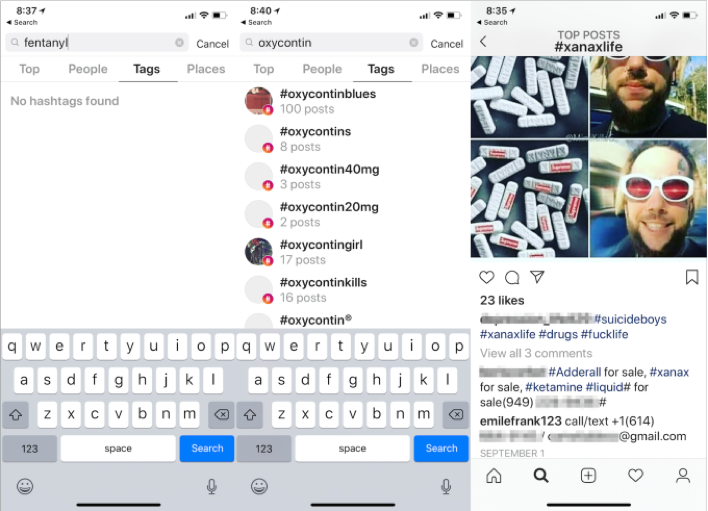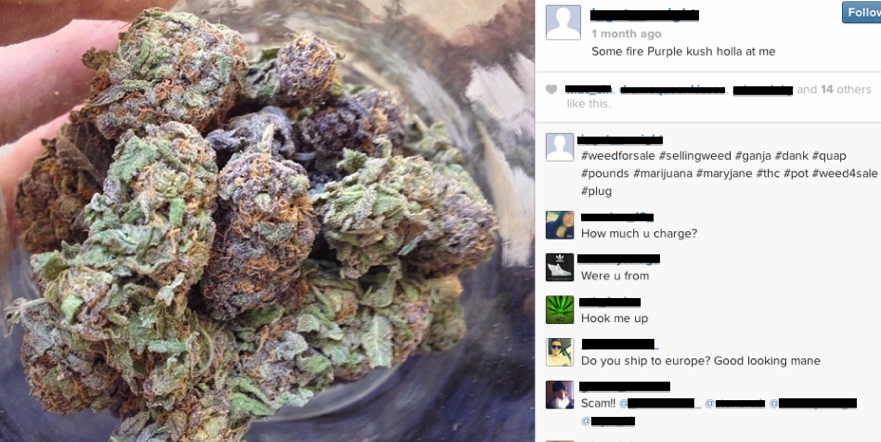Thought Instagram was for showing off selfies or sharing pics of your vacation in order to be the envy of your friends?
Apparently not…it’s now become the ideal place to connect with drug dealers. The word “obvious” is an understatement for how these dealers operate. With usernames like “ihavedrugs4sale” and drug-riddled posts/pictures, these users eagerly flaunt their offerings. The most popular items in their stock usually include marijuana, prescription painkillers, Xanax, molly (mdma), and lean (codeine syrup mixure).
For those struggling with drug addiction, this presents a huge problem. As the Washington Post reports, searching for the hashtags #oxy, #percocet, #painkillers, #painpills, #oxycontin, #adderall, and #painrelief will return a plethora of posts from Instagram users. Those users may be struggling with addiction, partying like it’s nobody’s business, or dealing the hashtagged drugs online.
The problem is Instagram’s algorithms can’t distinguish the context the hashtags are used in. And if a user then follows a dealer using the hashtags, Instagram’s algorithms then suggest that user follow more drug dealers. In the course of one day over 50 Instagram dealer accounts were found simply be searching for different hashtags like #weed4sale.
So how does the process work? It will surprise you, or maybe appall, at how simple it is.

Most dealer profiles have a bunch or “product” photos displaying their inventory and their contact information is in the bio or comments section. While some bravely post their mobile number, most use a messaging app called Kik. No phone numbers or personal info is exchanged here, only user to user messaging.
How are orders fulfilled? It’s as easy as ordering on Amazon. And sometimes faster.
You simply send a message with the product you are interested in purchasing and the dealer responds. Most dealers use wire transfer and can ship out the same day if you send money fast enough.
For what it’s worth, the ability to be connected with drug dealers via social media isn’t a problem unique to Instagram. The same types of posts are widespread on Facebook (which owns Instagram) and Twitter. In recent months Instagram has blocked search results for certain hashtags, such as #fentanyl, #cocaine, and #heroin, all illegal substances. But dealers simply switch to hashtagging their posts with legal drug names, or slightly tweaked the spelling of drug names–and then proceeding to sell both legal and illegal drugs to Instagram users when they connect with them outside of the platform.
Yet still, Instagram’s owner Facebook says it’s aware of the problem and is working to put a stop to the sale of illegal drugs through Instagram, though its initiatives are still in the “early stages.”
As Facebook’s vice president for global marketing solutions, Carolyn Everson, told the Washington Post:
“We’re not yet sophisticated enough to tease apart every post to see if it’s trying to sell someone illegal drugs or they are taking Xanax [because] they are stressed out. Obviously, there is some stuff that gets through that is totally against our policy, and we’re getting better at it.”
www.e-chatter.net
(866) 703-8238




